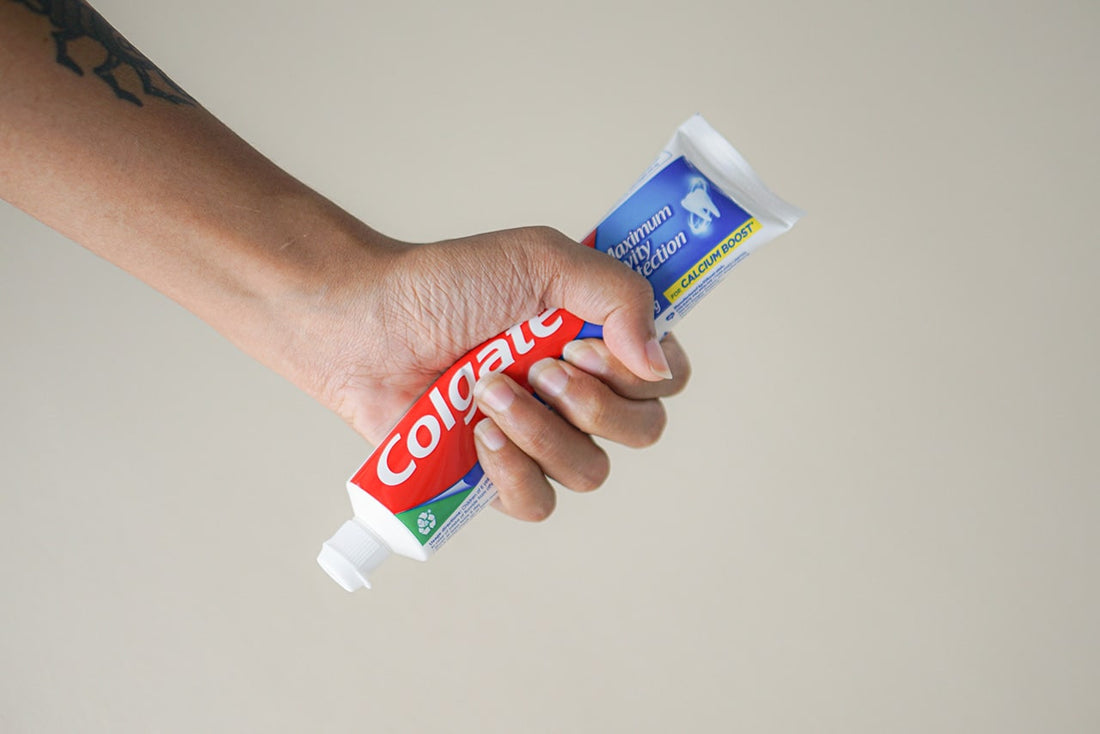
Brushed Over: The Truth About Colgate's Green Claims
Share
Let’s be real. Nobody finishes a tube of toothpaste and thinks, "Time to rinse it out for recycling!" We all just toss it and move on. That’s exactly why Colgate’s bold claims like "Recycle Me" or "Smile Sustainably" deserve a double take.
The truth is, HDPE toothpaste tubes are technically recyclable, but in real life? Almost no one cleans them properly, and most recycling centers won’t process them. That reality check hit me mid-scroll one evening while researching alternatives.
And that’s when it clicked: some brands are using eco claims as a mask, not a mission.
Turns out, not everything that looks green is actually clean. Welcome to the glossy, minty world of greenwashing.
(aka: What Greenwashing Looks Like in Your Bathroom Cabinet)
We all want to do better for the planet. Maybe you've swapped plastic bags for totes, started recycling more, or even composted that one time (go you). Then you walk into a store, see Colgate’s toothpaste in "recyclable" packaging, and think: "Nice. Easy eco-win."
But... plot twist: it's not that simple.
Welcome to the world of greenwashing, where brands say all the right things, but behind the scenes, it's business as usual.
What Is Greenwashing, Really?
Greenwashing is when companies make themselves look environmentally friendly without putting in the actual work. Think: "eco" labels, earthy colors, buzzwords like "natural" and "sustainable" all designed to make us feel good about buying their stuff.
But just because it looks green doesn’t mean it is green. That’s the catch.

So, What’s the Deal with Colgate?
Colgate has been rolling out big sustainability claims lately. Recyclable toothpaste tubes. Goals for zero waste. Optimistic press releases. On the surface, it all sounds promising.
But here’s where things start to fall apart:
Their toothpaste tubes are made from HDPE #2 plastic, which is technically recyclable. But practically? Most facilities don’t accept them. The tubes look too much like non-recyclable ones, and leftover toothpaste messes things up.
In 2023, Colgate was hit with a class-action suit. Plaintiffs argued that their "recyclable" claim was misleading, because in reality, most of those tubes still end up in landfills.
Zoom out, and the picture isn’t much greener. They’re still pushing plastic-heavy products and haven’t replaced their traditional line. So, while a few items look shiny and green, the rest? Same old story.
Why It Matters (And Why We're Talking About It)
When big brands make sustainability look easy but don’t follow through it creates confusion. It slows down real change. And it makes things harder for smaller companies that are actually walking the talk.
Worse, it makes you feel like you’re doing the right thing... when the impact isn’t what you were promised.
That’s why calling out greenwashing matters. And why we think Colgate, as a global giant, has a responsibility to do better.

How to Spot Greenwashing Like a Pro
Vague claims like "eco-friendly" or "green" with no specifics? Red flag.
No third-party certification on the packaging? Another red flag.
If the sustainability effort is all about packaging while the ingredients or processes remain questionable, that's not real change.
If you can't easily find info about the supply chain, or if the brand is selling "green" products right next to 10 not-so-green ones? You guessed it: red flag.
Bottom line? Trust your gut. If it feels like a marketing trick, it probably is.
Small Brands, Big Hurdles
At BRiN, we see this all the time. We’re a small company trying to do things differently from materials to packaging to pricing.
We don’t have Colgate’s budget. Or their marketing power. Or their shelf space in every pharmacy.
But we do have values.
We use ocean-bound plastic for our SeaDifferently toothbrush, Everything ships in recyclable kraft paper, and we keep our ingredient lists clear and honest. No greenwashing. No gimmicks.
We do this because we believe in real change. Not just for aesthetics. For impact.

What If Your Toothpaste Didn’t Come in a Tube?
What if your daily brush didn’t come with water waste, plastic tubes, or false promises? Our Solid Toothpaste Tablets are here to change the game. This isn’t just a new product, it’s a total rethink of how oral care should be.
Unlike traditional pastes that are nearly half water, our tablets are solid from the start. That means less water is used in production, and there's no unnecessary weight in shipping. Just clean, dry tablets that get activated with a quick chew and brush.
When you order for the first time, you’ll receive a sleek, reusable glass jar. After that? Refills arrive in minimal, recycled and recyclable kraft paper pouches. No plastic. No waste. Just what you need, in packaging that respects the planet.
It's cleaner for your mouth, smarter for your home, and lighter on the Earth.

This Isn’t Just About Toothpaste
This is about what kind of world we want to live in. When companies greenwash, they waste your trust and your good intentions. Worse, they slow down innovation by making it harder for genuine sustainable brands to stand out.
But it doesn’t have to be this way. You have more power than you think.
What You Can Do
Read past the label. Ask questions. Support transparent brands, especially the small ones doing the work with heart. Share posts like this. Talk about what matters. Hold brands accountable. And vote with your wallet- because it counts.
Greenwashing is real, and it’s slowing down actual change. But with a little knowledge (and a lot of heart), we can all make better choices and help build a cleaner, more honest future.
Let’s make your bathroom the starting point for that revolution.
🛁 💚
